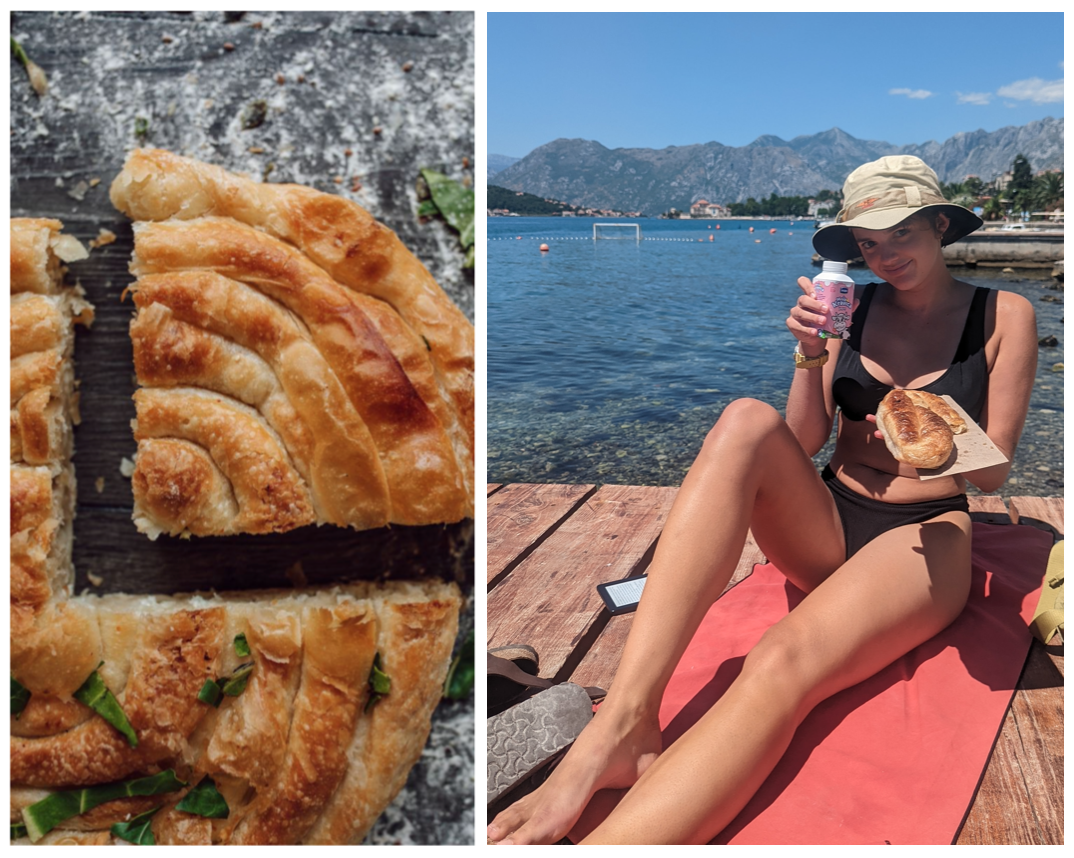After having spent around three months in the Balkans I’d say I’m familiar with most of their food. It’s pastry and meat based, with a lot of stuffed vegetables. White cheese is featured heavily, even in their salads, like the shopska salad. A lot of the food remained constant - bureks always available from bakeries, little doughnuts for breakfast at anywhere serving traditional food, plain meat patties always on the menu, fig jam and ajvar always ready to be spread on bread. But something I’ve enjoyed is watching how it slightly varies between countries, with each one having its own spin on dishes. I found that Albania had region specific dishes in a way that I didn’t see in the other countries, for example I had the Berati steak in Berat, and the Himare salad in, you guessed it, Himare. Below is a collection of photos of Balkan food and an in depth look on Burek.


Burek
This is a filo pastry pie. It’s not exclusive to the Balkans, being eaten in Israel, Northern Africa and Armenia to name some others. It originated in the Ottoman empire, so spread into the Balkans with the Ottoman rule in the 14th century. In the Balkans you will find it filled with either white cheese, spinach or meat. It’s eaten for breakfast, lunch or as a snack. You can purchase one from any bakery, for around 1.50/2 EUR. It’s served with a yogurt to drink alongside. It seems to come in two styles: i) one huge pie is cooked and you can buy a slice of this, or ii) as an individual pie. I prefer the huge pie version, I felt like you got a better filling to pastry ratio that way. I definitely favoured the meat burek, with the filling reminding me of a Cornish pasty, and therefore all of the warm home feelings associated with it. The spinach comes in second for me, with the cheese being a bit too much - too salty, too dense and a bit sickly. The meat one with the yogurt to wash it down really is a high class lunch (but will leave you desperate for some fruit or vegetables). It has a lot of cultural significance and is an icon of the Balkans, but not always in a positive way. Slovenia, a country that struggles with its identity as Balkan or Western European, shunned the burek, seeing it as a symbol of the ‘undeveloped Balkans, freighted with the metageographical baggage’ of the region (quoted from the book Everyday life in the Balkans, chapter titled ‘Burek, Da!’). The burek came to Slovenia with the formation of Yugoslavia, so perhaps the dislike towards it can be understood in that context. It shows one underlying current in Yugoslavia: the friction between the more developed and less developed countries. Taking a step back from Yugoslav politics and looking at the Balkans as a whole, I feel the burek also illustrates another reoccurring theme: the struggle between nationalism and homogeneous culture. The burek is found in all of the Balkan countries, but each claims ownership of it. When I was googling recipes for burek I found them titled ‘Croatian burek’, ‘Albanian burek’, ‘Bosnian pita’ etc. Rather than embracing the shared food, and their shared history, the nations either ignore it or are angered by it. Obviously there are reasons for this, the Balkan wars were recent and there is a long history of aggression between the nations (to quote a Macedonian man “We are brothers with our neighbouring countries, not friends. That means we like to fight.”). The shared burek speaks to their shared history, which may not be pleasant to remember.
Burek is one of the foods that I’ll definitely think back to, and likely crave. But it’s the only Balkan food that I feel that way towards! My old local pub in London recently had a burek pop-up from Mystic Borek, so I was happy to learn it’s possible to get burek in London. The lady behind it doesn’t have a permanent restaurant but you can order bureks from her, or just keep an eye out for her next pop-up at https://www.mysticborek.com/ (they look insane and I absolutely will be a customer once I’m back in London).
A burek recipe to try (more for my own use when I’m back home!): https://www.all-thats-jas.com/burek-meat-pie/

The main thing I loved about Balkan food wasn’t the food itself (it really did lack vegetables and was always heavy and salty) but becoming so familiar with it. Obviously I’m not an expert, but I could pick up a menu and explain to you what the majority, if not all, of the items are. I’ve eaten the traditional breakfasts, the traditional lunches, the traditional pastries in the traditional way, and all of the traditional meals for dinner. And perhaps I’m being harsh in saying it’s all heavy and salty, it is also often delicious, warming and made with passion. It was very enjoyable to eat. But it’s not the sort of food I personally enjoy eating all of the time!
Would cook at home
- Burek
- Shopska salad
- Vegetable or lamb soup/stew
- Tavce Gravce, bean stew